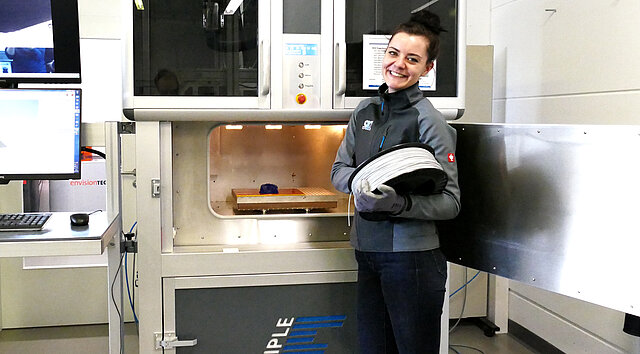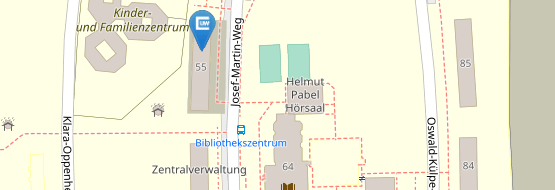Anne - research assistant
As a research associate, I conduct research into various 3D printing processes in order to further develop them for their diverse areas of application, and I am in constant dialogue with other research institutions and partners from industry. I am also involved as a lecturer in the SKZ's training and further education programme, which includes lectures and internships for the IHK, the THWS and of course the JMU, as well as independent courses.
For my work, I naturally need an in-depth understanding of the materials I work with, and my chemistry degree gave me that. As my colleagues and I also do a lot of research in the field of medical technology, my knowledge from the lectures at the Chair of Tissue Engineering and Regenerative Medicine, which I attended during my Master's degree, is proving to be very useful. The ten-month research stay abroad, which was part of the biofabrication degree programme, ultimately trained me to become an independent and solution-oriented researcher.
During my chemistry studies, I was already employed as a student assistant at my current employer, which was not only useful for my professional orientation, but also gave me a lot of experience for my later employment. This activity then also developed into a hobby, so that at some point I acquired my own 3D printer, which I still use in my free time today.During my time as a student assistant, I repeatedly took part in the SKZ's broad training and further education programme in order to learn directly from practical experience and gain an even better understanding of the various manufacturing processes and materials. I also volunteered in the chemistry student council initiative and outside the university in the care of the elderly.
I would recommend using internships to get a taste of as many areas as possible that you are interested in. Of course, depending on the degree programme and the time required, this can sometimes be difficult to achieve. In addition, a stay abroad not only looks good on your CV, but also contributes significantly to your personal development. During the application process, you shouldn't despair of the requirements listed in the job advertisements if you haven't yet acquired certain skills. Ultimately, it is important that you show your willingness to learn new things, as employment is always a question of personality and motivation in addition to the technical side.
3D printing is an extremely interdisciplinary field in which knowledge from areas such as materials science, process engineering, programming or even medicine may be required. There is therefore no such thing as THE degree programme or THE training course that really covers everything down to the smallest detail. That's why I recommend acquiring a core specialised skill, e.g. during your studies, and then continuing to learn by thinking outside the box. Ultimately, lifelong learning is part of every job and 3D printing is definitely a lot of fun!


